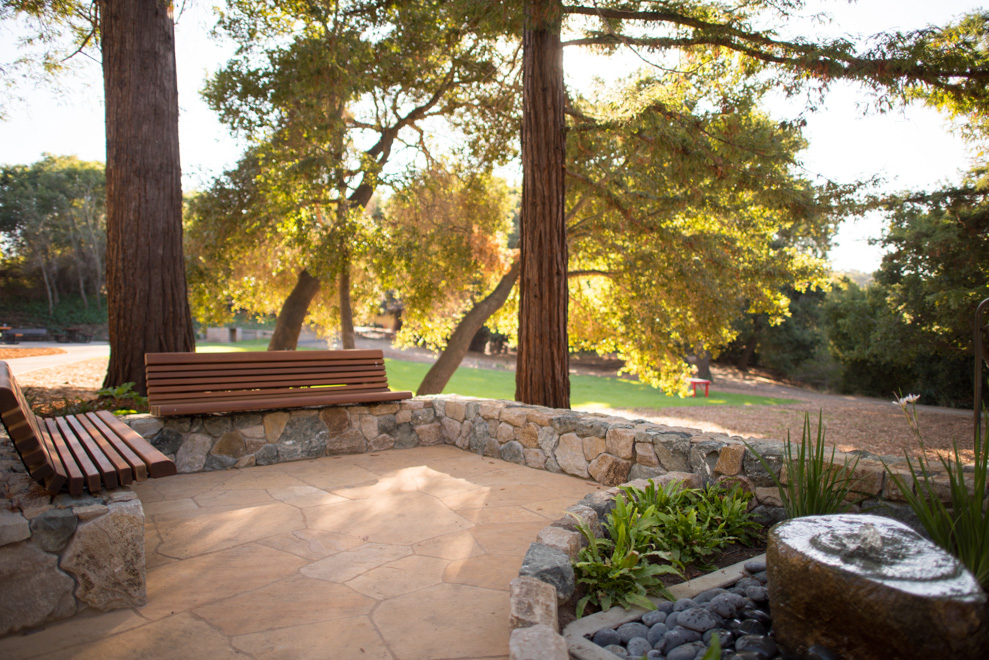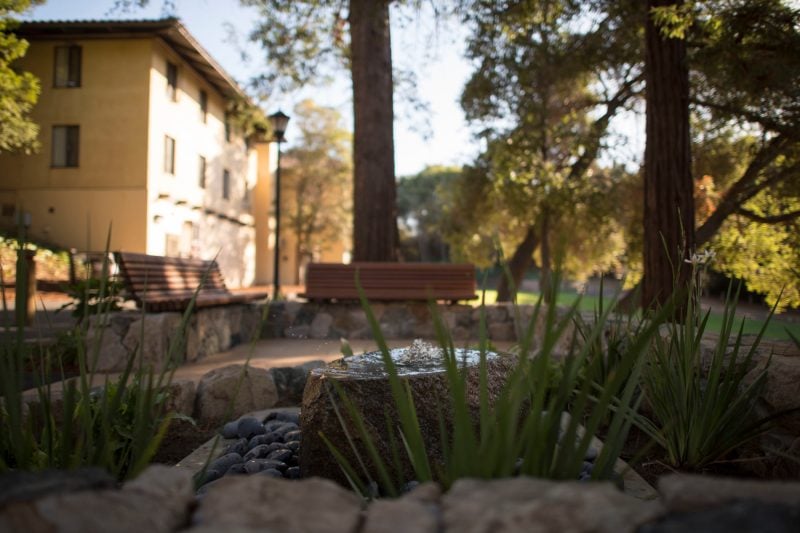Following re-landscaping outside the Kappa Alpha house, a stone-lined area with two benches and a fountain has replaced the dumpster by which former Stanford swimmer Brock Turner sexually assaulted a woman. The space was created in remembrance of the widely publicized 2015 crime.
Stanford plans to install a plaque on the landmark engraved with a passage from the viral 2016 letter that Turner’s victim — who has remained anonymous as “Emily Doe” — read to Turner at his sentencing.
“The quote, like the rest of the letter, is very powerful,” said Frederick I. Richman Professor of Law Michele Dauber, who proposed the project to the University and advocated for it with the consent of Doe, a family friend of hers.
“This is a letter that really affected, deeply, everyone who read it,” Dauber said. “I’m sure that it will be appropriate and powerful.”
Dauber praised University officials for their decision to install the landmark, a project which she said the University approved quickly after she suggested it last August.
“I was really happy that President [Marc] Tessier-Lavigne and Provost [Persis] Drell agreed to re-landscape the area and put the marker in, because it does symbolize the fact that they do want to make progress on this issue,” she said. “While more is to be done — and of course, I will continue to press for more to be done — I think they deserve substantial credit for agreeing to do this. It is an absolute step in the right direction towards creating community norms and standards around this issue.”
Stanford spokesperson E.J. Miranda declined to comment on the campus addition beyond a brief description of its purpose.
“This is a contemplative space for our community members,” he told The Daily in an email. “Out of respect for the victim, we have nothing further to add.”
Replacing the dumpster, which Dauber described as a “symbol of sexual assault,” was one factor that motivated her advocacy for the project around the time of Turner’s release from jail in September 2016.
Dauber also considered the marker’s future power, arguing that even when discussion of the Turner case subsides, it will serve as a reminder that sexual assault is still an issue on campus. Emphasizing the fact that two Stanford students intervened to stop Turner’s assault on Doe, Dauber said that the marker evokes not only the prevalence of sexual assault on Stanford’s campus, but also the power of bystander intervention.
“Using architecture to create historical memory can be a very powerful thing,” she said. “My hope is that other students who have experienced sexual violence will see this and realize that they’re not alone, that this does happen here, and that the University, by creating this, is expressing solidarity with those survivors and, in a sense, promising to do better.”
Kappa Alpha said in a statement that it “wholeheartedly agrees with the administration’s decision to place a contemplative space that brings awareness of sexual assault to the greater community.”
“We, along with our neighboring houses, see ourselves as stewards of this space and will do our very best to preserve its significance,” the statement read.

In Dauber’s view, a crucial element of the landmark is its context and location near the back door of the fraternity house, where many students walk as they enter parties similar to the one Turner and Doe attended in 2015.
“It happened right here,” Dauber said. “If students vulnerable to sexual violence are about to enter a party, and they pass by this, it will cause them to think, ‘Am I safe? What can I do here? Are my peers safe?’ It will be a moment of reflection for them.”
Alexis Kallen ’18, who has been vocal about combatting sexual assault on campus, echoed Dauber’s thoughts on the potential effects of the installation. Kallen recently worked with the University on another landscaping effort near Kappa Alpha, a project to pave and light the so-called dirt “Scary Path” that Kallen and some other students argued was unsafe at night.
“As freshmen head out to some of their first parties of the year in the next few weekends, I hope this memorial, as well as the recent buzz around changes to Title IX, encourages them to step up and hold a higher campus standard around intolerance of sexual assault this year and in the years to follow,” Kallen said.
Contact Courtney Douglas at ccd4 ‘at’ stanford.edu.
This article was updated Thursday to include comments from Kappa Alpha, whose president was contacted the afternoon of publication and did not have time to respond before the piece’s posting.
